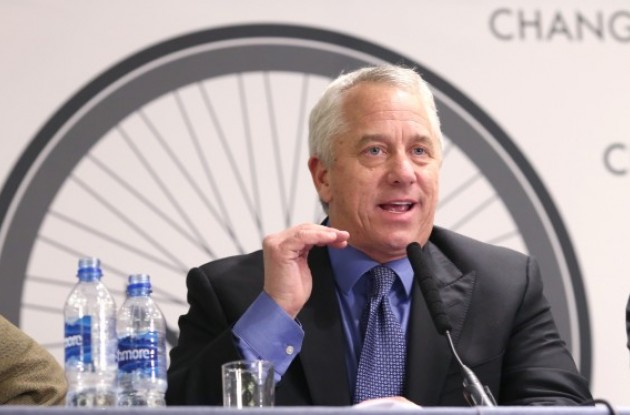Greg LeMond wants to run UCI
The three-time Tour de France winner said after Change Cycling Now's first meeting that he would be willing to run cycling in the interim.
"I would love to be part of the process of change and if that means as interim president then I would be willing to do that," LeMond said. "I said if we can't find anyone more qualified, I will do whatever I can to help change the sport. I am definitely not pushing myself ... cycling needs radical change, it needs new leadership."
Before the Change Cycling Now meeting in London, the UCI announced Friday that a three-man panel will scrutinize president Pat McQuaid and his predecessor Hein Verbruggen over their relations with Armstrong.
The sport is reeling from its most damaging scandal in which Armstrong was stripped of his seven Tour titles, among other victories, and banned for life after a damning report by the U.S. Anti-Doping Agency.
McQuaid was elected president not long after Armstrong first retired in 2005, and Verbruggen is now honorary president of the UCI.
The governing body denied claims made by former Armstrong teammates to USADA that it covered up suspicious samples from Armstrong in exchange for payments totaling US$125,000, or that the American rider enjoyed special protection.
But LeMond questioned how McQuaid and Verbruggen could remain in their roles until the panel, headed by a retired British judge, files its report in June.
"During this investigation you can't have the fox guarding the henhouse, and that means they need to willingly step down -- now," LeMond said. "Will they? Most likely not because they are protecting their own position. It will take pressure."
LeMond said cycling must be run by someone who is "beyond reproach."
"We need to find a great leader who can take the sport forward and repair the damage that has been done," he said.
Change Cycling Now is funded by sportswear company Skins, which is suing the UCI for US$2 million after claiming its brand has been damaged by backing the sport as the Armstrong scandal unfolded.
The International Olympic Committee executive board is this week discussing whether to strip Armstrong of his bronze medal from the 2000 Sydney Games.
"I still would love to see Armstrong come forward and reveal how, and I might even shake his hand if he would do this," LeMond said. "Because I think what he could offer is insight into really what was happening ... things don't happen by themselves. It was a huge effort by multiple people and he alone can reveal that.
"It would be one redeeming thing he could do for cycling, because he has done a lot of damage for cycling."
While Change Cycling Now is trying to pitch itself as the organization to lead the overhaul of cycling, no current riders attended its two-day meeting in London.
Skins chairman Jaimie Fuller, who is fronting the group, claimed more than ten cyclists rebuffed his invitation to attend.
"There were a couple who it was geographically difficult for, but the vast majority were intimidated about what could happen to them if they stuck their heads above the parapet and were critical of the UCI," Fuller said.
Speaking on the same media conference panel as Fuller, investigative journalist Paul Kimmage claimed cyclists are "terrified of what the repercussions might be -- that's not the sign of a healthy organization."
But Australian anti-doping scientist Michael Ashenden, who helped the UCI develop its anti-doping biological passport project, believes the organization has a future.
"I don't believe there is a need to dissolve the UCI," Ashenden said.








